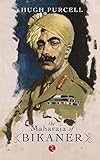Maharaja of Bikaner
Material type: TextPublication details: New Delhi Rupa 2013Description: 187pISBN: 9788129124685Subject(s): Princes | Great Britain Army -British Indian Army | Generals | Paris Peace Conference | Paris Peace Conference 1919-1920 | Maharaja of Bikaner, 1880-1943DDC classification: 940.40092 Summary: Dynamic, enigmatic and a spirited public figure, Ganga Singh (1880-1943), the twenty-first maharaja of Rajasthan, was one of the last Indian princes to play an important role in the politics of the British Empire. He lent his support to the British Army in both the World Wars by fighting on the Western Front and in Egypt. A soldier in his own right, he commanded his own camel corps, the Ganga Risala and became the first ever Indian general of the British Indian Army a contribution that was rewarded by invitations to London for the Imperial War Conference in 1917 and the Paris Peace Conference in 1918, where he signed the iconic Treaty of Versailles. At home, Ganga Singh built the famous Gang Canal, which transformed Bikaner from a town plagued by famine and poverty to a thriving centre of trade. Against the backdrop of the Home Rule Movement, he managed to persuade the British to include India in the League of Nations no mean feat, as India was not an independent nation at the time. In The Maharaja of Bikaner, Hugh Purcell profiles one of the most pragmatic rulers that India has ever known and in the process, chronicles the role of the Indian princes in the British Empire.
TextPublication details: New Delhi Rupa 2013Description: 187pISBN: 9788129124685Subject(s): Princes | Great Britain Army -British Indian Army | Generals | Paris Peace Conference | Paris Peace Conference 1919-1920 | Maharaja of Bikaner, 1880-1943DDC classification: 940.40092 Summary: Dynamic, enigmatic and a spirited public figure, Ganga Singh (1880-1943), the twenty-first maharaja of Rajasthan, was one of the last Indian princes to play an important role in the politics of the British Empire. He lent his support to the British Army in both the World Wars by fighting on the Western Front and in Egypt. A soldier in his own right, he commanded his own camel corps, the Ganga Risala and became the first ever Indian general of the British Indian Army a contribution that was rewarded by invitations to London for the Imperial War Conference in 1917 and the Paris Peace Conference in 1918, where he signed the iconic Treaty of Versailles. At home, Ganga Singh built the famous Gang Canal, which transformed Bikaner from a town plagued by famine and poverty to a thriving centre of trade. Against the backdrop of the Home Rule Movement, he managed to persuade the British to include India in the League of Nations no mean feat, as India was not an independent nation at the time. In The Maharaja of Bikaner, Hugh Purcell profiles one of the most pragmatic rulers that India has ever known and in the process, chronicles the role of the Indian princes in the British Empire.
| Item type | Current library | Call number | Status | Date due | Barcode |
|---|---|---|---|---|---|
 BK
BK
|
Stack | 940.40092 PUR/M (Browse shelf (Opens below)) | Available | 53624 |
Dynamic, enigmatic and a spirited public figure, Ganga Singh (1880-1943), the twenty-first maharaja of Rajasthan, was one of the last Indian princes to play an important role in the politics of the British Empire. He lent his support to the British Army in both the World Wars by fighting on the Western Front and in Egypt. A soldier in his own right, he commanded his own camel corps, the Ganga Risala and became the first ever Indian general of the British Indian Army a contribution that was rewarded by invitations to London for the Imperial War Conference in 1917 and the Paris Peace Conference in 1918, where he signed the iconic Treaty of Versailles. At home, Ganga Singh built the famous Gang Canal, which transformed Bikaner from a town plagued by famine and poverty to a thriving centre of trade. Against the backdrop of the Home Rule Movement, he managed to persuade the British to include India in the League of Nations no mean feat, as India was not an independent nation at the time. In The Maharaja of Bikaner, Hugh Purcell profiles one of the most pragmatic rulers that India has ever known and in the process, chronicles the role of the Indian princes in the British Empire.


There are no comments on this title.